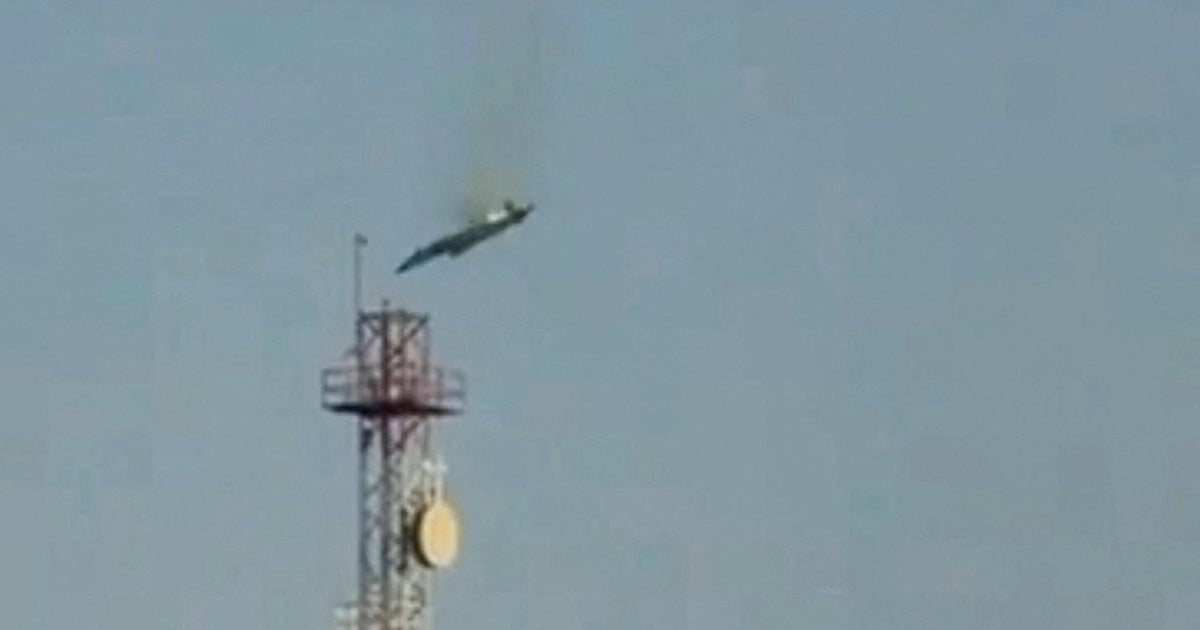North Korea fires missile over Japan, Pentagon says
SEOUL -- North Korea launched a missile that flew over Japan, the Pentagon confirmed to CBS News.
"North American Aerospace Defense Command (NORAD) determined the missile launch from North Korea did not pose a threat to North America," Pentagon spokesperson U.S. Army Col. Rob Manning said in a statement. "We are working closely with Pacific Command, Strategic Command and NORAD and will provide an update as soon as possible."
Seoul's Joint Chiefs of Staff said on Tuesday the South Korean and U.S. militaries were analyzing the launch. South Korea said the missile flew 1,677 miles and reached a maximum height of 341 miles.
Local media broadcaster NHK says the North Korea missile broke into three pieces and fell into the waters off Japan's Hokkaido island in the Pacific Ocean. There was no damage to ships or anything else reported.
A tweet showed a J-Alert in the wake of the launch:
Residents on the northernmost Japanese island of Hokkaido were warned of a North Korean missile launch by a "J-Alert" on their cellphones, with loud alarms and an email that told people to stay indoors.
The system also is designed to kick in an automated voice repeating the warnings on area loudspeakers.
Hironori Matsuura, an official in the coastal town of Erimo, said the phone alarm worked but not the 50 speakers in the town.
Matsuura said people were stunned as this is the first time a North Korea missile is believed to have flown over Hokkaido. The town, which has about 4,800 residents, is checking on what went wrong with the speaker system.
"We all woke up," he said. "But there are no reports of any damage, and no one had to evacuate."
Hokkaido prefectural official Hirofumi Tsujii said J-Alert was set off throughout the prefecture, and officials were checking on malfunction reports.
Japanese Prime Minister Shinzo Abe said Tuesday that he agrees with President Trump in telephone talks to increase pressure on North Korea following its latest show of force, Reuters news agency reports.
Mr. Trump said the United States was "100 percent with Japan" and showed a strong commitment to Tokyo's defense, Abe told reporters.
Also, South Korea says its air force conducted a live-fire drill in response to the latest North Korean missile launch.
Seoul's presidential spokesman Park Su-hyun said Tuesday that four F-15 fighters dropped eight MK-84 bombs that accurately hit targets at a military field near South Korea's eastern coast. The country's air force says a MK-84 bomb has an explosive yield of a ton.
Park Su-hyun, spokesman of South Korean President Moon Jae-in, said the exercise was conducted after Moon directed the military to "display a strong capability to punish" the North.
Park also said Moon's national security director Chung Eui-yong and Seoul's Foreign Minister Kang Kyung-hwa called Trump's national security adviser H.R. McMaster and U.S. Secretary of State Rex Tillerson, respectively, to discuss the launch.
A U.N. Security Council diplomat tells CBS News that the U.S. and Japan have requested a meeting of the Council on North Korea's latest ballistic missile launch, CBS News' Pamela Falk reports. It will likely to be in closed-door consultations Tuesday afternoon.
Meanwhile, a former South Korean military official who is now an analyst at Seoul's Institute for Far Eastern Studies said that the early flight data suggests the missile was likely a Hwasong-12, a new intermediate range missile that the North has recently threatened to fire toward Guam.
Analyst Kim Dong-yub a said there was also a possibility the missile could have been a midrange Musudan, a missile with a potential 2,180-mile range that puts much of the Asia-Pacific region within reach, or a Pukguksong-2, a solid-fuel missile that can be fired faster and more secretly than weapons using liquid fuel.
The Japanese government warned people in northern Japan to take precautions, Reuters writes.
South Korea's military strengthened its monitoring and preparation in case of further actions from North Korea. The launch, which appears to be the first to cross over Japan since 2009, will rattle a region worried that each new missile test puts the North a step closer toward its goal of an arsenal of nuclear missiles that can reliably target the United States.
North Korean missile launches have been happening at an unusually fast pace this year, and some analysts believe that the North could have such an arsenal before the end of Mr. Trump's first term in early 2021.
Japanese bullet train service has been suspended in northern Japan and citizens in Japan were warned not to approach any debris.
Japan's Chief Cabinet Secretary Yoshihide Suga said Tuesday the missile launch was a threat that Tokyo would respond to firmly, Reuters reports.
"This ballistic missile launch appeared to fly over our territory. It is an unprecedented, serious and grave threat to our nation," the top government spokesman said.
Prime Minister Abe told reporters that the Japanese government had been "completely" aware of and monitoring the North Korean missile launch Tuesday, noting that it had been prepared to protect people's lives.
He said he will call for an urgent meeting in the U.N. to discuss further action, strongly demanding stepped up pressures against North Korea.
He said Japan will be prepared to "respond to all situations," under the bilateral alliance with the U.S., to protect people's safety.
British foreign secretary Boris Johnson took to Twitter to slam the latest launch from North Korea (Democratic People's Republic of Korea or DPRK):
A video posted on Twitter purportedly records the announcements made over loudspeakers in the wake of the missile launch:
Tuesday's news comes on the heels of Kim Jong Un's firing of several short-range missiles into its East Sea on Friday. Those failed and exploded upon launch.
The launch over Japan isn't a total surprise. Earlier this month, when threatening to lob four Hwasong-12s, which are new intermediate range missiles, into the waters near Guam, North Korea specifically said they would fly over Japanese territory. North Korea in June also angrily reacted to the launch of a Japanese satellite it said was aimed at spying on the North and said Tokyo was no longer entitled to fault Pyongyang "no matter what it launches or whether that crosses the sky above Japan."
North Korea typically reacts with anger to U.S.-South Korean military drills, which are happening now, often staging weapons tests and releasing threats to Seoul and Washington in its state-controlled media. But animosity is higher than usual following threats by Mr. Trump to unleash "fire and fury" on the North, and Pyongyang's stated plan to consider firing some of its missiles toward Guam.
North Korea's U.N. ambassador, Ja Song Nam, wrote recently that the exercises are "provocative and aggressive" when the Korean peninsula is "like a time bomb."
North Korea first fired a rocket over Japanese territory in August of 1998 when a multistage rocket that outside experts called "Taepodong-1" based on the name of the village it was launched from flew about 1,500 kilometers (932 miles) before landing in the Pacific Ocean. The North later said it launched a satellite.
North Korea flew another rocket over Japan again in April 2009 and said that, too, was carrying a satellite. The North claimed success, but the U.S. North American Aerospace Defense Command says no satellite reached orbit. The United Nations has repeatedly condemned North Korean satellite launches as covers meant to test banned long-range missile technology. Some parts of a space launch vehicle reportedly flew over Okinawa last year after separating from the rocket.
Pyongyang regularly argues that the U.S.-South Korean military exercises are an invasion rehearsal, although analysts say the North's anger is partly because the impoverished country must react with its own expensive drills and weapons tests. The allies say the war games are defensive and meant to counter North Korean aggression.



